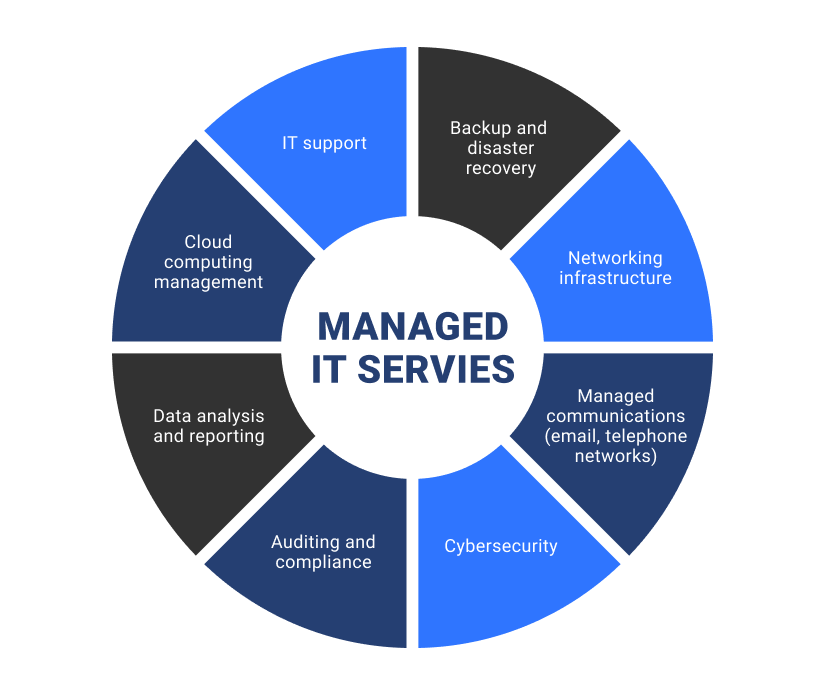The “Compute Engine Instance” is a differential copy of a virtual machine. The source of a virtual machine for any “instance” is the image from which it is deployed. When you create a compute engine instance in a project, you specify the zone, operating system, and machine type of that instance. When you delete an instance, it is removed from the project. Compute Engine provides recommendations to help users optimize the resource utilization of your virtual machine (VM) instances.
Understanding the Differences: MSP vs MSSP
Understanding the Differences: MSP vs MSSP
In today’s digital landscape, it’s crucial to understand the differences and benefits of Managed Service Providers (MSPs) and Managed Security Service Providers (MSSPs). These are two key players that businesses leverage to ensure their IT systems run smoothly and securely. But what sets them apart?
I. Managed Service Providers (MSP)
An MSP offers a range of IT services. They manage a company’s IT infrastructure, ensuring systems remain operational and efficient.
Roles and Responsibilities of MSP
Here’s a closer look at what an MSP does:
- Network Maintenance: They monitor and maintain your network to ensure it remains operational and efficient.
- Server Management: They manage your servers to ensure they remain up and running at optimal performance.
- Application Support: They offer support for all IT-related applications.
- Infrastructure Management: They manage your entire IT infrastructure, including hardware and software systems.
Proactive Approach to IT
MSPs don’t just fix problems; they proactively look for ways to improve your systems. This includes:
- Regular Maintenance
- Troubleshooting IT Problems
- Implementing IT Updates and Upgrades
Support Model
MSPs offer a blend of remote and onsite support. They provide regular reporting to keep you informed about your IT infrastructure’s status. Moreover, MSPs typically provide a user helpdesk for direct support.
II. Managed Security Service Providers (MSSP)
An MSSP, on the other hand, specializes in security services. Their primary focus is to protect your systems from various cyber threats.
Roles and Responsibilities of MSSPs
MSSPs offer specialized cybersecurity services:
- Firewall Management: They manage and monitor firewall systems to protect your network from threats.
- Intrusion Detection: They deploy intrusion detection systems to identify any malicious activity in your network.
- Incident Response and Management: They respond to and manage any security incidents to minimize damage.
- Vulnerability Testing: They conduct tests to identify and address any potential weaknesses in your network.
Proactive Approach to Cybersecurity
MSSPs, like MSPs, also take a proactive approach, but their focus is on maintaining your cybersecurity. This includes:
- Regular Security Audits
- Threat Intelligence and Analysis
- Implementation of Security Protocols and Updates
Compliance Management
MSSPs assist companies in meeting regulatory requirements and ensuring that data privacy and protection standards are met.
III. Key Differences between MSP and MSSP
While MSPs and MSSPs share some similarities, they have distinct differences:
- Focus: MSPs are centered on general IT services, whereas MSSPs specifically target security concerns.
- Nature of Services: MSPs offer operational support, while MSSPs provide security-focused services.
- Level of Expertise: MSSPs possess specialized knowledge and expertise in cybersecurity.
- Compliance Management: MSSPs specialize in ensuring compliance with regulations and data protection standards.
IV. Conclusion
Both MSPs and MSSPs play vital roles in today’s business landscape. MSPs maintain the operational efficiency of your IT systems, while MSSPs focus on safeguarding your digital assets from cyber threats. Depending on your business needs, you may require the services of one or both.
Understanding the differences and benefits of MSP vs MSSP empowers you to make informed decisions and strengthen your overall IT infrastructure and security.
What is Computer Engineering?
What is Computer Engineering?
Computer engineering is the study and design of computer systems and their components, such as hardware, software, and networks. It is a complex and demanding field that necessitates a high level of technical knowledge and skills. Many people who are thinking about a career in computer engineering may be wondering if it is a difficult field to study and work in. This question will be discussed in greater depth in this article.
To begin, it is critical to recognize that computer engineering is a highly technical field that necessitates a solid foundation in mathematics, physics, and computer science. A strong aptitude for these subjects, as well as the ability to apply them to real-world problems, is required for students pursuing a degree in computer engineering. Coursework for a degree in computer engineering can be extremely difficult, covering topics such as digital logic design, computer architecture, and programming languages.
Furthermore, the field of computer engineering is constantly changing and evolving, with new technologies and innovations being introduced on a regular basis. This means that computer engineers must stay current on industry developments and be able to adapt to new challenges as they arise. They must be eager to learn and willing to constantly broaden their knowledge and skills.
Furthermore, computer engineering necessitates a high level of problem-solving ability. Computer engineers will face a variety of challenges and obstacles as they work to design and develop new systems and products. They must be able to determine the root cause of a problem and devise innovative solutions that meet the needs of their clients or users. This can be a time-consuming and difficult process that requires patience, perseverance, and attention to detail.
Computer engineers must have strong communication and collaboration skills in addition to technical and problem-solving abilities. They frequently collaborate with other engineers, as well as clients or stakeholders, and must be able to effectively communicate their ideas and solutions to others. They must be able to work.
To summarize, computer engineering is a difficult and complex field that necessitates a high level of technical knowledge, problem-solving abilities, and the ability to adapt to new technologies and innovations. While it can be a difficult field to study and work in, it also has the potential to have a significant impact on the world through the development of new technologies and systems. If you want to work in computer engineering, you should be prepared for challenges and have a strong desire to learn and solve problems. You can succeed in this exciting and ever-changing field if you have the right mindset and dedication.

